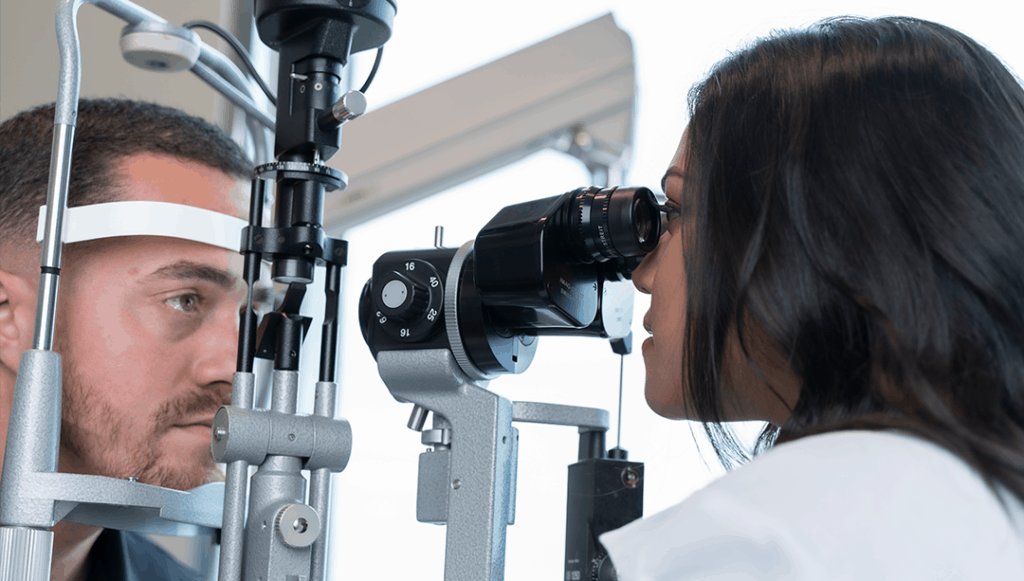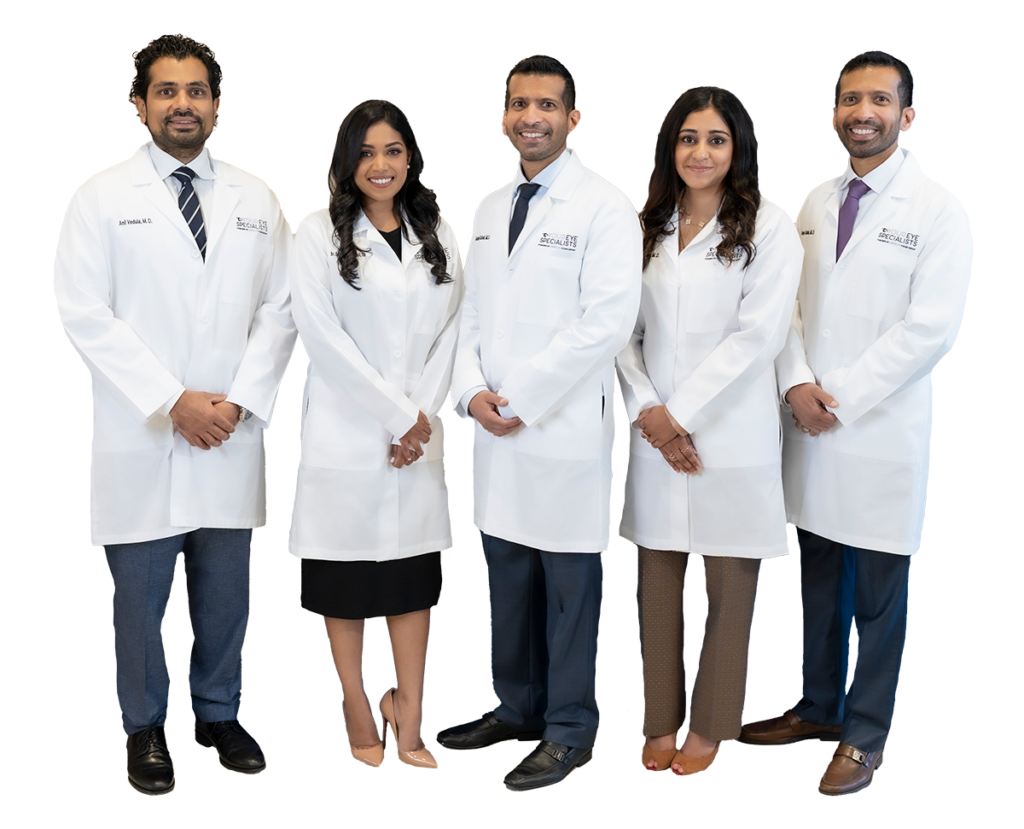Eye Exams
To maintain good vision and to keep your eyes healthy, it is important to have a routine eye exam. For those with stable vision and without any eye diseases, having regular eye exams every year is important.
Early detection of problems with an eye exam can be the key to preventing loss of vision.

What Can I Expect During an Eye Exam?
During the eye examination, your eyes will be dilated so that the doctor can see into your retina. The doctor will check your vision and screen for any potential eye diseases or disorders. If further testing is required, a more comprehensive eye exam will be scheduled at one of our five convenient locations in Aventura, Plantation, Fort Lauderdale, Pembroke Pines, or Weston. We can provide quality eye care services to diagnose and treat a broad range of eye-related problems.
If you experience any changes in your vision between regularly scheduled visits with your eye specialist, you should schedule an appointment as soon as possible.
Good vision is one of life’s true necessities. To ensure that your eyes are healthy, it’s important to get them checked regularly. Here at Your Eye Specialists, we offer top-quality comprehensive eye exams at a reasonable price for adults and children.
For adults, our comprehensive exams include a refraction eye exam as part of a routine eye examination. You may know this exam by another title: a vision test. This examination allows your doctor to prescribe the necessary eyeglasses or contact lenses.
Perfect vision is also known as 20/20 vision. Individuals with perfect vision can read letters 3/8 of an inch tall from a distance of 20 feet. Many people, however, need eyeglasses or lenses to read such text from a distance. If your vision is below 20/20, you have what is known as a simple refractive error. Your eye’s lens does not bend the incoming light properly.
A refraction eye exam will allow your doctor to prescribe a lens that will correct your vision to 20/20, or as close to that as possible. Refraction eye exams also often help doctors to diagnose astigmatism, myopia, and presbyopia.
Other components of a comprehensive eye exam include:
- Review of family and personal health history
- Examination of the interior and exterior of the eye for signs of eye disease or general health problems, such as diabetes or high blood pressure
- Eye pressure and field of vision tests to evaluate for glaucoma
- Tests of ability to see sharply and clearly at both close and far distances
- Tests to determine the presence of nearsightedness, farsightedness, astigmatism, depth perception problems, and in people over age 40, presbyopia
- Check of eye coordination and eye muscle function to make sure the eyes are working together as a team
- Test of ability to change focus quickly from near to far, and vice versa
Many Americans include a yearly eye exam in their regular health routine. You probably know that these eye exams allow your doctor to determine whether or not they can improve your eyeglass prescription.
However, many people do not realize that routine eye exams can also offer a glimpse into your overall health. Your eye doctor can catch early warning signs of diabetes, brain tumors, or high cholesterol. Obvious symptoms of these conditions do not usually appear until some damage has been done. This makes eye exams the perfect method to keep tabs on them. Your eyes provide a clear view of the blood vessels, arteries, and cranial nerve, all of which a doctor can use to determine your overall health.
First and foremost, an eye exam ensures you have the correct prescription for eyeglasses or contact lenses. Without near-20/20 vision, you may experience distorted vision, headaches, and even accidents.
The majority of eye care experts recommend having a complete eye exam once every one to two years. The exact frequency depends on age, risk factors, and whether you currently wear eyeglasses or contact lenses.
All children should get routine eye exams. Children who are at risk for vision-related issues, or who already wear eyeglasses, should have an annual eye exam. Most adults (ages 18 to 60) should schedule an eye exam every two years. Annual exams are recommended for seniors above age 60.
Furthermore, “at risk” adults should inquire about more frequent examinations. Risk factors include a family history of eye disease, diabetes, high blood pressure, eye injuries, or previous eye surgery. If any of these could be an issue for you, speak to your doctor about an exam. Please do not hesitate to schedule an eye exam with Your Eye Specialists. Eye exams are fast and completely pain-free.
As with many doctor’s appointments, most patients do not know what to bring to an eye exam.
First and foremost, remember to bring any eyeglasses or contact lenses that you wear on a regular basis.
Next, be sure to have a complete list of your current medications – not just prescription medications. An experienced eye doctor will survey the list and determine whether any medications may affect your vision.
Finally, be sure to have contact information and insurance information prepared for the front desk. If this is your first time visiting our office, this information will go into your patient file. You might also consider writing down any important questions that come to mind. Do not hesitate to ask your eye care specialist about anything that troubles you regarding your vision.
Good vision is vital to a child’s development. Infants’ and young children’s vision systems are still actively forming. In order for the vision centers of the brain to completely develop, they need balanced input from each eye. If either of a young child’s eyes cannot send clear images to this vision center, the child’s eyes may become limited in ways that are impossible to correct.
If a doctor detects this vision issue early on, however, they can easily treat the problem before conditions worsen. Our comprehensive eye exams for children include:
- Check for indications of crossed eyes and poor visual development (including amblyopia)
- Check to ensure the child is using both eyes
- Tests to determine how well the child’s vision skills are developing
- Tests to determine normal color vision
As a parent or guardian, you should schedule a pediatric eye exam when the child is first born, and then again during infancy, preschool, and early school years. A professionally-trained eye care physician can perform screening right in the office. Five to 10 percent of preschoolers suffer from vision problems early in life.
To ensure that your child develops good vision, make identifying these issues a priority.
Say Yes to South Florida’s Premier Eye Care Center
Are you in need of eye care? Schedule an eye exam and talk to an experienced YES doctor about treatments. Contact Your Eye Specialists at 954-452-9922 or request an appointment online today.
What People Are Saying About Us
Trust Your Vision to South Florida’s Premier Eye Doctors
Saying YES is all it takes!


